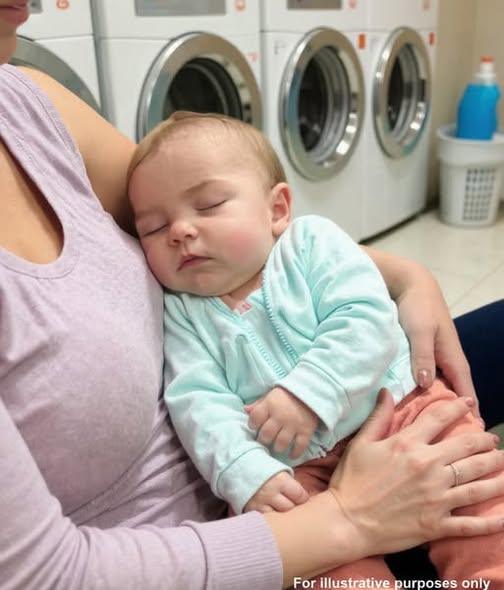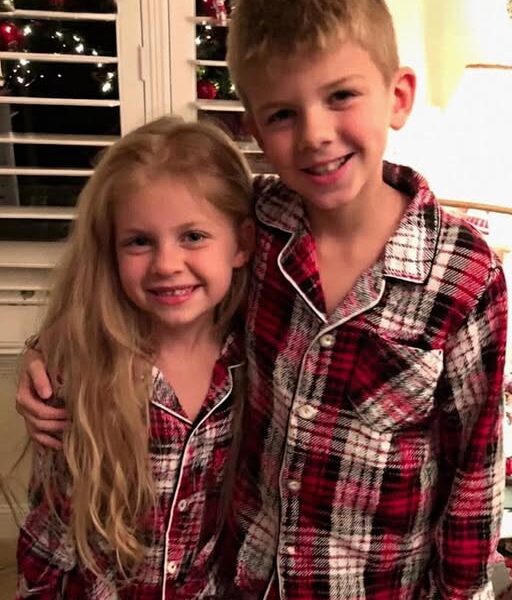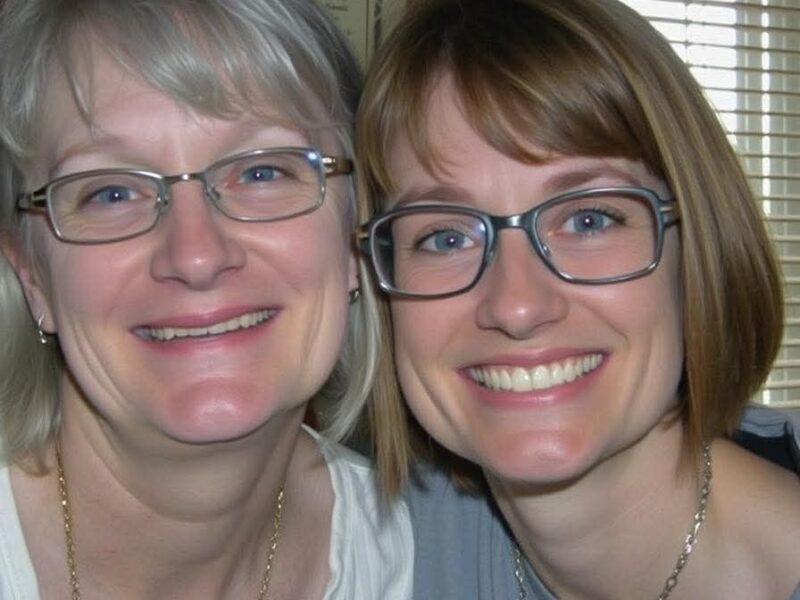By the time I dragged myself to the laundromat that morning, I was running on fumes. I’d just finished another night shift at the pharmacy, and every part of me ached. My seven-month-old daughter, Willow, was asleep in my arms, her small head tucked under my chin. All I wanted was a few hours of rest—but the overflowing laundry basket by the door said otherwise.
I work whatever shifts I can get. When someone calls in sick or the store is short-staffed, I step in. The extra pay is the only thing keeping formula, diapers, and rent from becoming wishful thinking. Willow’s father didn’t stick around long enough to learn how to change a diaper. When I told him I was pregnant, he said, “I’m not ready for this,” like fatherhood was a jacket he could shrug off. By the fifth month, I stopped expecting his calls.
Now it’s just me, my mom, and Willow against the world. Mom watches her while I work. She’s 61, long retired, and had every right to a quiet life—but instead, she’s up at 2 a.m. heating bottles and singing lullabies. I tell myself the guilt I feel is gratitude, but the truth is both sit heavy in my chest.
We rent a small apartment on the second floor of an old building. It’s fine—creaky floors, leaky faucet—but there’s no washing machine. When the laundry piles up, I haul it to the corner laundromat with the flickering neon “OPEN” sign and the smell of detergent that never quite covers the damp.
That morning, the place was almost empty. Just one woman in her fifties folding clothes, the kind of person who looks like she’s seen it all and still finds a reason to smile. She glanced up as I walked in. “What a beautiful baby,” she said warmly.
“Thank you,” I murmured, managing a tired smile.
She left a few minutes later, and then it was just me, Willow, and the rhythmic churn of the washers. I dumped everything—her onesies, my uniforms, towels, her elephant blanket—into one machine. Everything we owned could fit in a single load. I started the wash, sat down in a plastic chair, and rocked Willow as she began to fuss.
She was warm against me, breathing softly, her tiny hands curled under her chin. I had nothing clean to wrap her in, so I took a blanket from the top of the dirty pile, shook it out, and tucked her inside. The rhythmic hum of the machines became a lullaby. My eyelids grew heavy. I told myself I’d rest them for just a second.
I woke to silence.
The machines had stopped. The sun was higher now, flooding the room with light. Willow was still in my arms, peaceful as an angel. But something felt different. My laundry wasn’t in the washer anymore—it was folded. Perfectly folded.
On the table next to me were neat stacks of clothes: my pharmacy shirts folded like new, Willow’s tiny outfits sorted by color, towels stacked in precise squares. For a moment, I just stared, frozen between gratitude and fear. Someone had done this. Someone had been near us while I slept.
My heart thudded. I checked Willow. She was fine. Everything was there. But when I turned toward the washer, I saw it was still full. Through the glass door, I caught sight of something unexpected. I opened it slowly—and my breath caught.
Inside was a pack of diapers. Two cans of formula. Baby wipes. A stuffed elephant with floppy ears. And a soft fleece blanket folded neatly on top. There was also a small note.
My hands trembled as I unfolded it.
“For you and your little girl. —J.”
That was it. Simple, kind, and utterly overwhelming. I looked around the laundromat, but it was empty. Whoever “J” was had come and gone, leaving behind more generosity than I’d seen in months. My throat tightened. Tears came before I could stop them.
When I got home, I spread everything out on the bed. My mom came out of her room, rubbed her eyes, and froze when she saw the diapers, formula, and toys. “Honey,” she whispered, “there are still good people in this world.”
I stuck the note to the refrigerator with a sunflower magnet. Every time I saw it, it reminded me that kindness still existed—and that someone out there had seen me, really seen me, and cared enough to help.
A week later, after another brutal double shift, I climbed the stairs to our apartment. My feet were screaming, and my mind was fog. But outside the door sat a wicker basket—the kind you’d take on a picnic.
Inside were groceries: oatmeal, bananas, jars of baby food, a box of crackers. And tucked among them, another note in the same neat handwriting.
“You’re doing great. Keep going. —J.”
I laughed and cried all at once, right there in the hallway, clutching the basket to my chest. Who was this person? How did they know what we needed?
That night, after putting Willow to bed, I wrote a note of my own:
“Thank you. Please tell me who you are. I want to thank you properly.”
I slipped it under the doormat. Days passed. No reply. The note just sat there, gathering dust. Eventually, I told myself it didn’t matter who J was. Maybe it was better not to know. Maybe that’s what made it special.
Then one morning, coming home after another night shift, I saw a man standing by the gate of our building. He looked nervous, shifting from foot to foot. When our eyes met, he gave me a small, uncertain smile.
“Harper?” he asked softly.
It took me a second. Then I recognized him—Jaxon. The quiet boy from my high school English class. Always sitting in the back, always wearing hand-me-down clothes too big for him. The kid people teased without mercy.
“Jaxon?” I said.
He nodded. “Yeah. It’s been a while.”
We stood there for a moment, the years catching up between us. He rubbed the back of his neck, just like he used to when he was nervous. “This might sound weird,” he said, “but my mom goes to that laundromat sometimes. She lives nearby. A couple weeks ago, she told me about this young woman she saw there—sitting by the washers, holding a baby, looking exhausted. She said you reminded her of someone she knew. Then she realized it was you.”
My heart thudded. “Your mom… she was there that morning?”
“Yeah. Her name’s Diane. She couldn’t stop thinking about you. When she told me, I couldn’t either. You were the only person who was ever kind to me in school, Harper. You stood up for me when everyone else laughed. I never forgot it. So when I realized it was you, I wanted to do something. You once told me that kindness costs nothing, remember?”
I swallowed hard. “You didn’t owe me anything.”
He smiled faintly. “Maybe not. But I wanted to give back what you gave me back then—someone believing I mattered.”
I didn’t know what to say. My throat was tight. Tears burned my eyes.
After that day, Jaxon became a quiet constant in our lives. He’d show up with diapers or groceries, sometimes fixing a squeaky door or a broken chair without being asked. He never stayed long, never made a fuss. Mom started calling him “Uncle J,” which made him blush every single time. It wasn’t romantic—it was something simpler and deeper. Gratitude.
Months later, my manager called me into his office. He told me I was getting steady hours and a raise. Someone, he said, had called to recommend me. Claimed I was one of the hardest workers they’d met. He wouldn’t tell me who, but I didn’t need him to.
That night, I came home, kissed Willow goodnight, and looked at the note still pinned to the fridge. The ink was fading a little, but the words were as strong as ever.
“For you and your little girl. —J.”
I smiled through my tears. Because kindness doesn’t disappear. It waits quietly, sometimes for years, and then it finds its way back to you—folded into fresh laundry, tucked inside a wicker basket, or standing outside your gate with a shy smile and a reminder that goodness never really leaves. It just comes home when you need it most.


